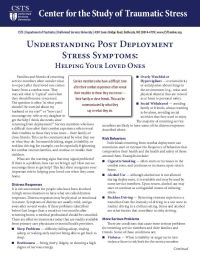Understanding Post Deployment Stress Symptoms: Helping Your Loved Ones
Families and friends of returning service members often wonder what to expect after their loved one comes home from a combat zone. They may ask what is “typical” and when should they become concerned. The question is often “at what point should I be worried about my husband or my son?” or “how can I encourage my wife or my daughter to get the help I think she needs since she returned from deployment?” Service members who have a difficult time after their combat experience often reveal their troubles to those they most trust— their family or close friends. This can be communicated by what they say or what they do. Increased drinking, anger, irritability, or reckless driving for example can be especially frightening for combat veteran families, and confuse or trouble their children.







